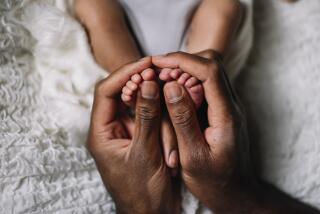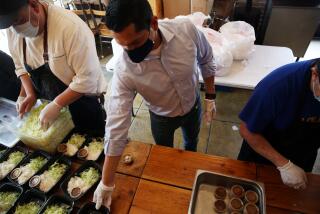Help for Grand Helpers
- Share via
The everyday challenges of raising a child are tough at any age. Imagine this task if the child is 7 and you’re 74.
It’s a distressing sign of the times: 2.4 million grandparents are now taking care of approximately 4.5 million grandchildren, and another 2 million children live with other relatives. More alarming, in just one decade, from 1990 to 2000, the number of children raised by grandparents or other relatives has grown by more than 50%. In California, almost 300,000 grandparents have their grandchildren living with them.
The grandmas-turned-moms in California come from all racial and ethnic groups: Latino (42%), African American (12%) and non-Latino white (33%), according to the U.S. Census Bureau. They are making it their business to save innocents from parents ravaged by drug addiction, sick relationships or mental disability, or absent because of prison or death. Many of these substitute parents don’t know how to navigate getting a kid into school or how to apply for economic and food benefits to which the child is entitled.
Many grandparents who take care of grandchildren do it without securing legal authority to do so. Sometimes, the reasons are emotional: the often vain hope that the absent, adult child-parent will awaken to responsibility. Other times, the grandparent wants to officially take charge but finds the social-service system too cumbersome to manage. However, there are legal risks to the grandparent-caregivers in unauthorized guardianship, and children may suffer if the caretaker lacks the legal right to make important health or education decisions.
Grandparents also often need to find psychological, medical and educational assistance for their grandchildren who, more often than not, are coming out of traumatic situations with their parents. That pressure adds to the financial burden of elderly caregivers already on a fixed income.
But in all this bad news, there is some good: There is help for the helpers. Grandma’s House (now named the Kinship Resource Center), toll-free at 888 MY-GRAND, is a division of the county Department of Children and Family Services, offering advice and referrals. The Department of Public Social Services has a central help line at (877) 481-1044. Legal guidance for parent-grandparents is also available, free of charge to those with low incomes, through private organizations like Bet Tzedek Legal Services in Los Angeles at (323) 549-5879 or the Public Counsel Law Center Children’s Rights Project at (213) 385-2977.
State programs, such as Kin-Gap and the Adoption Assistance Program, (213) 252-4030, can identify cash assistance for the ranks of grandparents daring to provide a permanent home to children in need.


